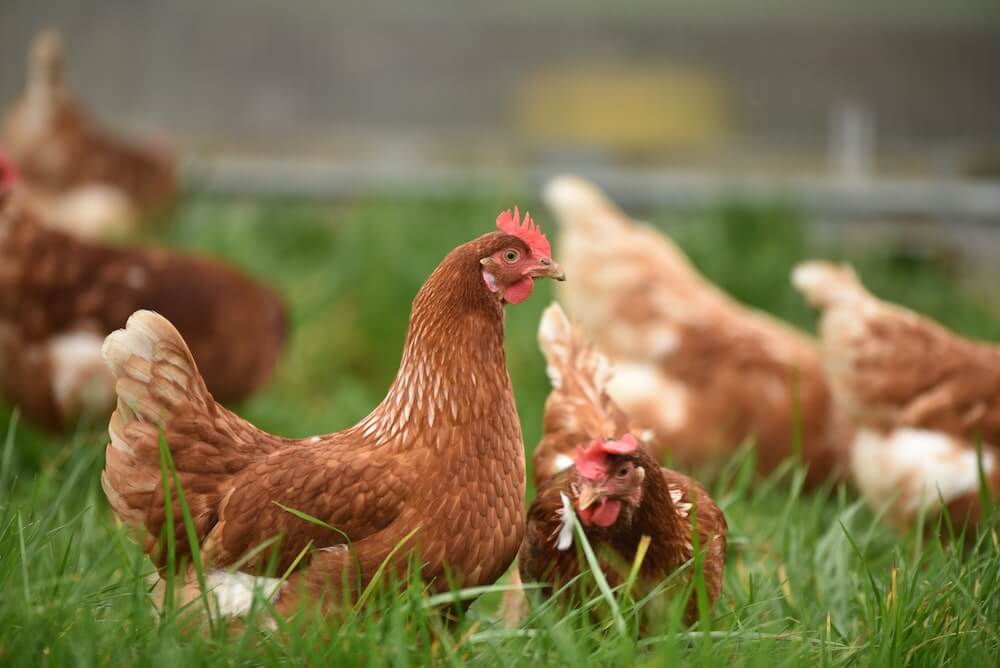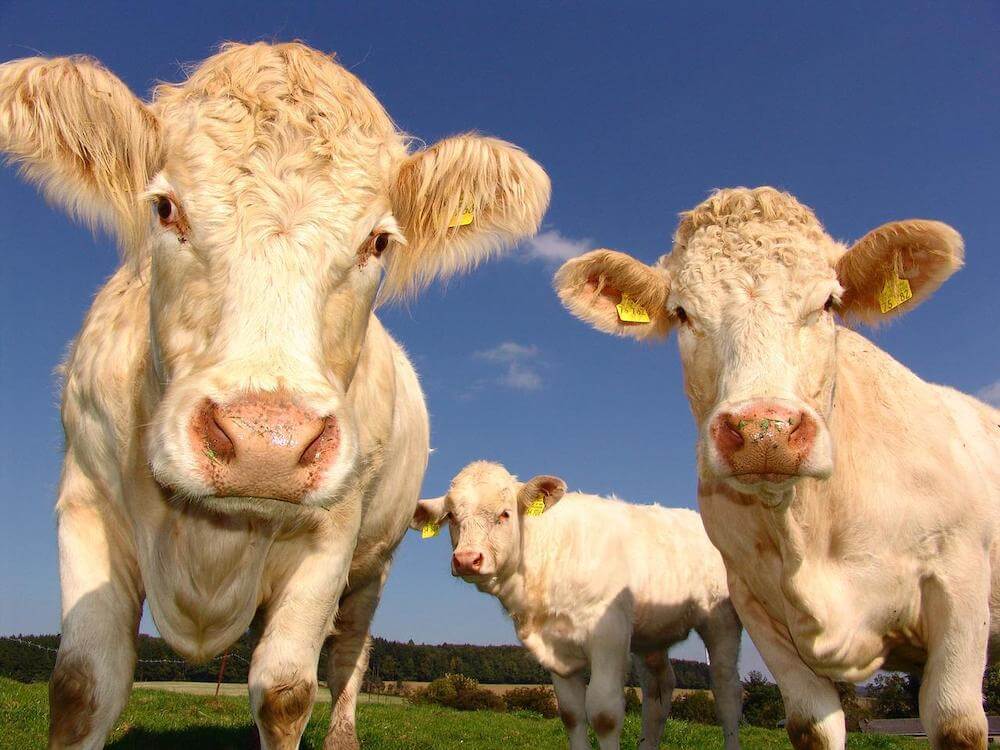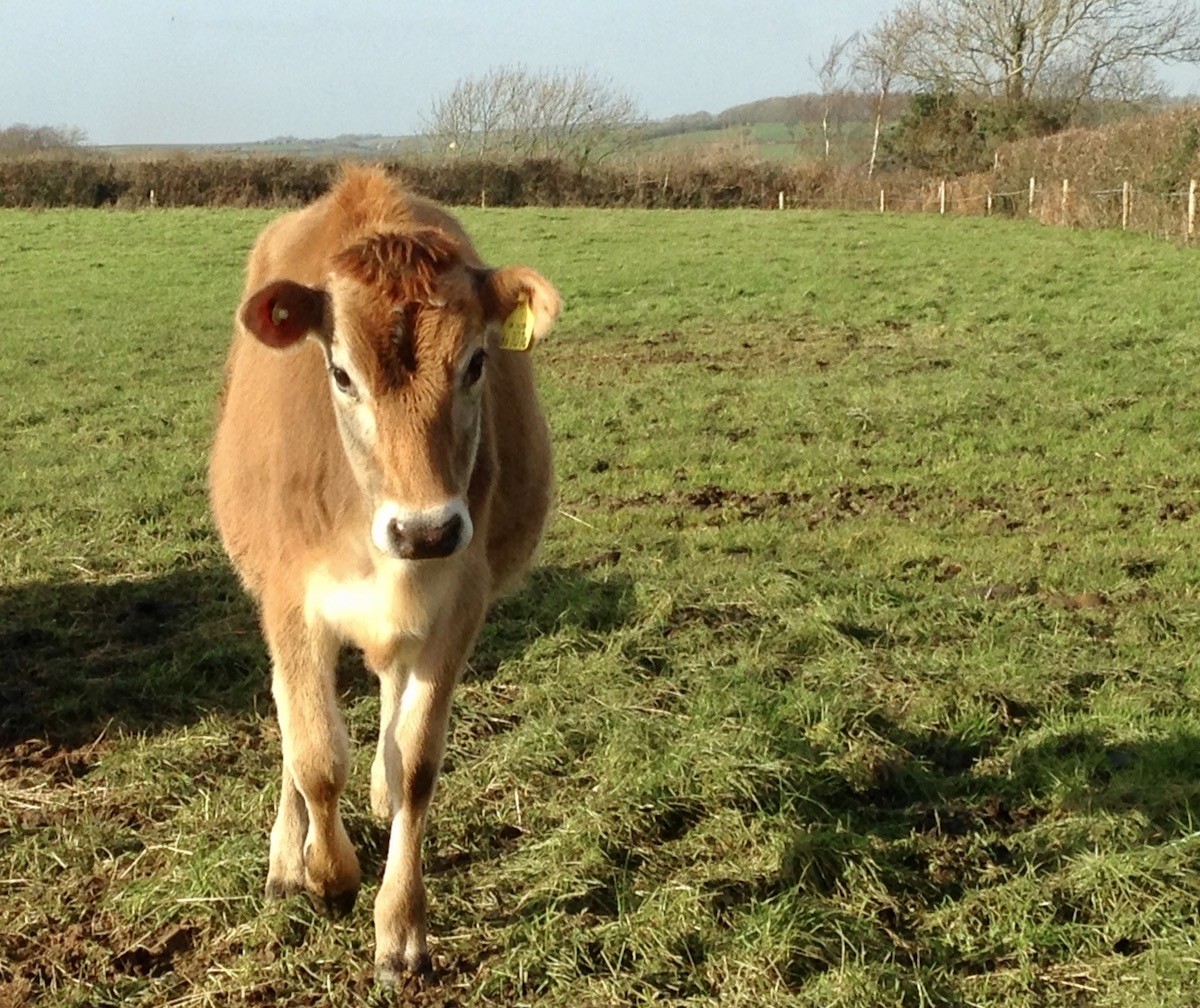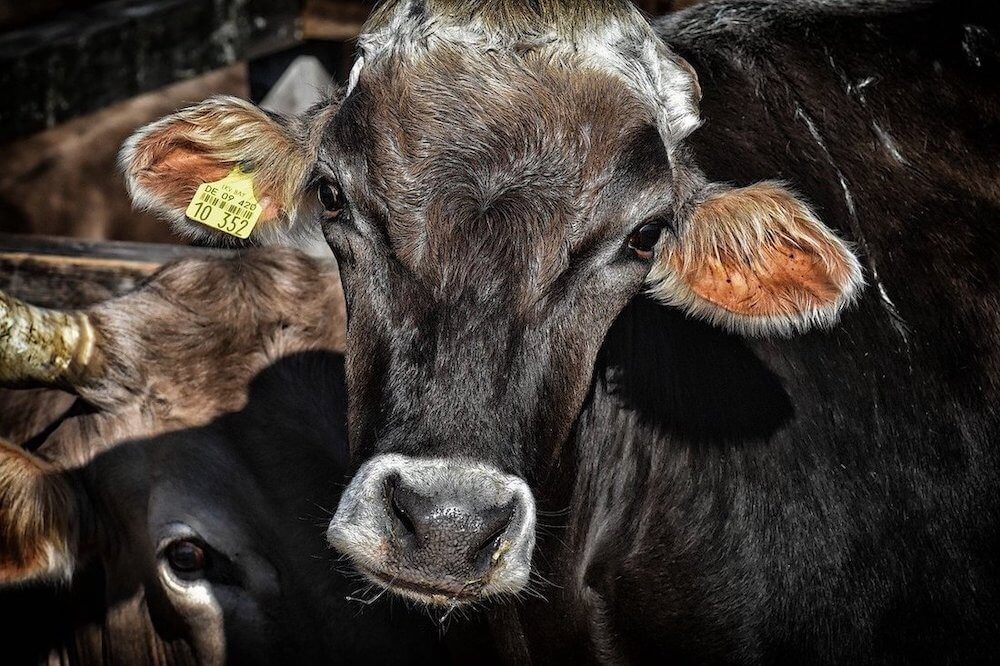The question can vegans eat eggs, or more specifically, can vegans eat eggs from free range hens, is hotly debated within the vegan community.
At its core argument, the answer is firstly that you can eat whatever resonates as being right with you, and secondly, it may not resonate as being right once you look into it.
A well informed vegan probably won’t eat eggs regardless of where they come from.
But the argument remains unclear for many about why not. Why wouldn’t a vegan eat eggs if they come from happy, free range chicken, or even from their own backyard chickens?
So here is a post to clarify both sides of the debate.
Table of Contents
Why Wouldn’t a Vegan Eat an Egg from a Free, Happy Chicken?
This is the question many people ask – and some vegans may feel that maybe they would, while others will argue passionately (aggressively even) that if you consider eating an egg, you can’t call yourself vegan.
(As you may know from my previous posts, I find pedantic arguing about the right to call yourself vegan, unproductive, unhelpful and uninteresting because it’s just terminology. What counts is that we want to do better. We want to live according to our morals of peace and justice.)
When we try to make more ethical choices, we grow, step by step into a more aligned person. But it’s a journey and isn’t based on reaching a destination so much as by continually learning more ways to make sure that your money only supports things you believe to be fair and just.
So if you’re still debating whether free range eggs are ok, or asking yourself why honey isn’t vegan, then go ahead and investigate.
We each have to find our path toward inner alignment with what we support in the world.
It’s interesting to analyse what things we feel are acceptable to us as human beings who are trying to live in alignment with our peaceful inner child, our morals, and in accordance with our beliefs.
And it’s fascinating to analyse whether or not a free range egg is something you would accept or not, when you’re trying to create consumer habits to feel proud of.
It’s a question I’ve pondered many a time before coming to the place where I am now.
But to really answer the question of whether a vegan would want to eat an egg from a happy, free range hen, we have to peel back the layers of the ‘onion’ one by one, until we uncover the core aspects involved in producing an egg for human consumption in the first place.
Example of Happy Chickens & Eggs
So you have a friend who has 10 pet chickens that live in the garden. They have a hut where they can take protection and a perch to roost on at night; they eat high quality food and get to scratch around in the dirt.
These pet chickens lay eggs and leave the eggs lying around or in their nesting boxes. Unless there’s a cockerel with the hens and the hen is broody, the eggs will most probably go to waste, unless they’re taken by a rat or eaten by one of the hens.
So where is the problem in eating the egg?
Well there are several reasons but answer isn’t as simple as all that, so let’s delve in deep, starting with worst case scenario and ending with the more ethical free range chickens.
Why are Eggs Not Vegan: Commercial Eggs
There’s no argument in favour of commercial eggs as far as a vegan goes.
The production of eggs for the mainstream market has practices which are cruel beyond belief. And that’s to put it mildly.
Animals Are Living Creatures, Not a Commodity to Be Exploited in Factories
There are over 360 million laying hens in Europe, laying 6.9 million tonnes of eggs each year. They are killed at around 72 weeks old when their egg production slows down.
Commercial factories treat animals, including chicken, as commodity and an economical resource. They become the source of a product, which means economical viability is placed higher than personal quality of life.
One of the fundamental reasons for going vegan for the animals comes from altering our perspective on this point.
An animal is a living breathing being and we believe they have as much right to a quality of life as we ourselves have.
Once an animal is exploited for its body secretions, flesh or other product such as eggs, it becomes a commodity and instead of being treated as a living being – and its life becomes a business model.
Profit margins take priority.
For this reason, vegans don’t eat shop-bought eggs of any kind, as by buying those eggs you are supporting the egg industry. And the egg (and chicken) industry have practises which are not imaginable as being allowed.
But they are. Allowed.
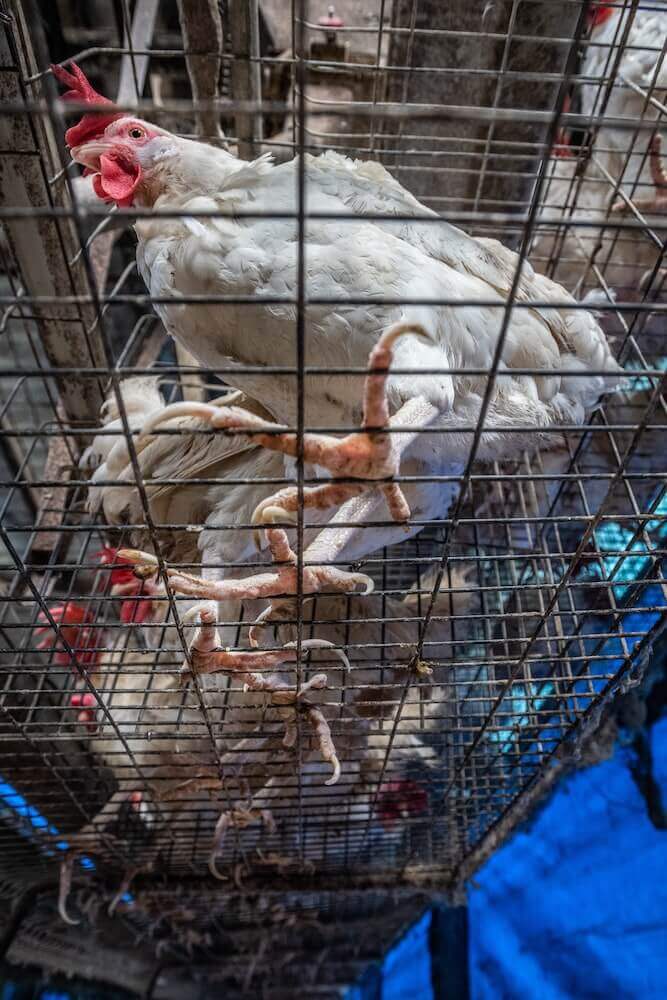
The Problem of the Male Chicks
There are two main types of commercial chicken production: one is for meat and the other for eggs. The meat chicken are bred to quickly put on weight so that they can be slaughtered at 8-12 weeks old.
The males from egg laying breeds do not grow fat enough to be used for the meat industry. So the only chicks which are viable for egg production are the female chicks, which will grow into egg laying hens.
So that leaves a problem: what to do with the male chicks?
To solve this issue, the chicks are put on a conveyor belt and a handler grabs each chick to inspect the chick and separate the males from the females, passing (often throwing) the male chicks onto a different belt from the females.
The one-day old male chicks are then boxed up and sent into a gas chamber, or sent along the conveyor belt where they drop directly into a macerating machine which chops them up alive.
The process of gassing or macerating the 1 day old male chicks is standard practice.
This is legal procedure all across the world, from Australia, America to the UK.
The UK uses gas as the preferred method to kill the chicks, but elsewhere, maceration is the norm.
In the UK alone, 29 million male chicks are gassed or macerated each year and the number goes up to 7 billion if you look at the global figure.
Adult Hens in Chicken Farms
If you’re not a 1 day old male chick destined to be macerated or gassed, you’re sent to a farm where you will produce eggs for the egg industry.
The unnatural selective breeding to create a hen that’s an egg machine means that modern hens produce 250-300 eggs a year while a wild chicken would lay around 15 a year.
There are different types of eggs on the market, but all of them are mass-produced, taking away the chicken’s natural lifestyle and replacing it with tons of chickens, either all living crammed all together or separated into cages where the hens are jammed into small cages.
Laying hens are normally ‘depopulated’ (killed) at 72 weeks of age when they are considered ‘spent’ because their egg laying production slows down.
As horrible as it is, you can easily Google for articles such as how to depopulate end-of-lay hens responsibly which shows so clearly how the animals is viewed as a ‘thing’. So a young bird of 1-2 years old is no longer producing high yield eggs, and then it’s fine to kill it . . .
Among other things, the article offers advice on how to limit the broken bones that are suffered by hens being caught prior to depopulation (killing), which is apparently a common occurence in the egg industry.
The lifespan of a hen living out its natural lifespan is very variable depending on breed, environment, general health, genetics, natural predators and accidents, but the general consensus is between 8-12 years. The oldest hen on record was 16 years old.
If you think about it, that’s similar to how long a dog lives, maybe slightly less but broadly speaking similar. Then think about the fact that the birds are killed at just under a year and a half old.
Types of Commercial Eggs
There are various types of egg to choose from in the supermarket, but what does the labelling actually mean?
Sadly, the marketing often conjures up images of happy chickens, but has nothing to do with the reality of their lives.
Can Vegans Eat Eggs: Free Range Eggs
When you read ‘free range’ you may imagine a few chickens running around in green pasture, pecking at the ground and clucking in joy.
But the truth is that the legal term ‘free range’ means that the chicken must have access to the outdoors for at least part of the day (or in some countries the whole day). ‘Access’ can be a pop hole to the outside which is opened for a short time a day.
It’s so vague and in each country will vary, but nowhere does it actually ensure that the chickens must GO outside or LIVE outside. The communicating door is key to labelling the eggs ‘free range’.
There’s also no minimum time per day specified which they have to be outside. The door to the outside can be closed in adverse weather or for any other reason.
The maximum chicken per metre in the EU are 1000 chicken per hectare. Because each country will have variations on the egg production terms and labels, there isn’t much point going into the details here, as this post is about global veganism.
Bottom line: no country in the world produces free range eggs where the chickens live in small groups in large fields with a natural lifespan. Instead they have a highly artificial lifestyle created by an industry of chicken exploitation where the hen must lay egg after egg after egg in a crowded environment with a chopped beak and a certain death at around 72 weeks.
Can Vegans Eat Eggs: Barn Eggs
Barn eggs refer to chicken which are raised in large numbers within the shelter of a large barn. 10,000 chicken in one barn is not unusual and many can hold 30,000. The chicken are free to move but because of the crowded situation, barn chicken can have other problems.
There is a higher incidence of aggression among the birds and they commonly have their beak trimmed, known as debeaking to try to limit the damage they can do when pecking at one another. This process applies to all types of egg production.
Disease in a barn can spread rapidly, especially if the living conditions aren’t optimum.
Can Vegans Eat Eggs: Organic Eggs
Organic eggs means that the chicken are fed organic food. It doesn’t have any reflection on how the chicken are raised, which could be in a cage, barn or free range.
Can Vegans Eat Eggs: Cage Eggs
Sadly, when battery farming was banned in Europe, instead of banning the whole way of keeping the hens in small cages, battery cages had to be ‘enriched’ battery cages. This means they must have 600 cm2 of space per hen.
That’s less than the size of an A4 paper.
Cage eggs are still the most frequent source of eggs available in the EU but there is a move to rid farming of caged eggs due to pressure from animal welfare. They are also the most common type of egg available in the USA and in Australia.
Caged chicken live in squashed conditions, crammed into cages without access to sunlight or contact with the ground. These hens lay eggs which are automatically collected. They have no access to free movement.
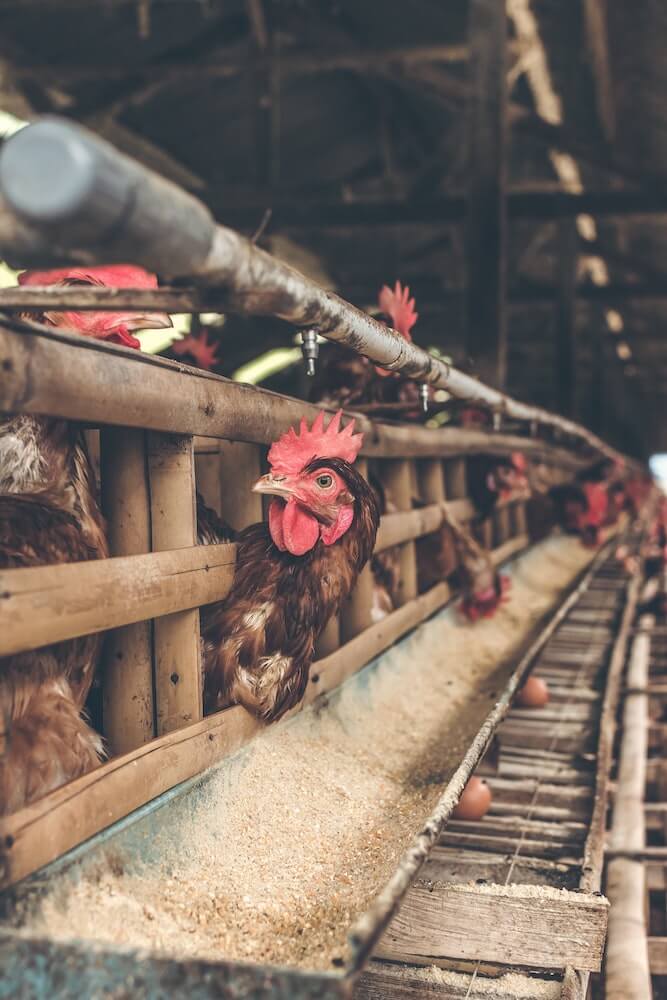
You can read more about the lifecycle of laying hens on the Compassion for World Farming website.
Can Vegans Eat Eggs from Pet Hens in the Garden?
So if we agree that no vegan would never buy eggs, putting their desire to eat an egg above the welfare of a chicken, what’s the score with a truly happy pet chicken?
Rescued Hens Vs Bought Hens
When you rescue chicken from an egg farm or slaughter house and you have them running around in your backyard, provided the hen isn’t broody and sitting on her eggs, you’ll have no problem finding eggs lying around, which theoretically, you could eat without having any impact on anything.
But if you have hens that have been bought, you’re still supporting the whole cycle of hen production and male chick maceration. Every time somebody buys a chick for their back yard, they’re sponsoring a system that treats hens as though they weren’t living breathing creatures but just factory items.
What if your neighbour has happy hens and offers you some lovely free range eggs? Well the real point that goes against vegan concept of not exploiting animals is that your neighbour most probably bought those hens from the egg industry.
Ask your neighbour what he does when a hen stops laying and he’ll probably tell you that he wrings the neck at that point. So we’re back to square one with the hen being granted a life only to obtain the egg.
Bottom line: no egg is vegan – but rescued hens who are happily scratching around in the dirt produce the closest thing to a vegan egg.
Take a look at Earthling Ed’s video explaining the vegan stance on backyard eggs.
Personally, if somebody had a) hens running around their garden b) which weren’t bought from the industry c) which could live out their natural lifespan without being ‘depopulated’ (killed) and d) which were laying eggs and e) weren’t broody f) and if I wanted to eat the egg and g) if I were offered one . . . then maybe I would eat it.
The crux of the matter is ‘exploitation of animals’ – and not supporting cruelty.
So if you’re really sure that your neighbours’ hens are truly pets and did not cost 10 male chicks their lives . . . then maybe you’ll feel fine to eat their eggs.
To be honest, I’ve never been a big fan of eggs so it isn’t an issue for me (what a cheat lol!).
What can Vegans Eat Instead of Eggs?
There are several options for vegan eggs: flax, chia, black salt, tofu . . .
Vegan Scrambled Egg
For scrambled eggs, we can eat scrambled tofu which is a perfect egg substitute.
Fried Egg
Spanish pisto traditionally has a fried egg on top. For this, you can make a tofu egg just for fun. It doesn’t actually taste like egg but it’s pretty cool just the same.
Vegan Flax Eggs
A flax egg simply refers to flax seed (linseed) that has been soaked in water. It turns into a gel which behaves like an egg in baking recipes.
Vegan Black Salt Eggs
Black salt is another trick in the vegan kitchen. It smells very strong of egg and adds an egginess to food that’s potent. Personally, I don’t like the smell, so I don’t use black salt to try and replicate the taste of egg.
I hope you enjoyed this post on the much asked question of can a vegan eat eggs if they are free ranged. Do you have any points to add?
